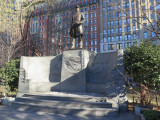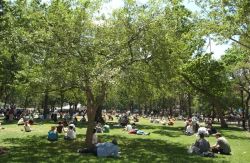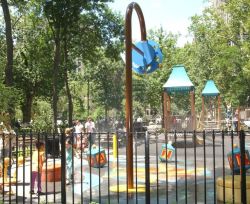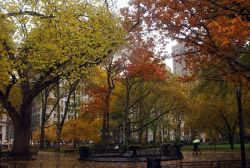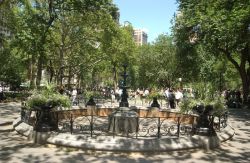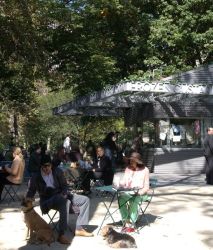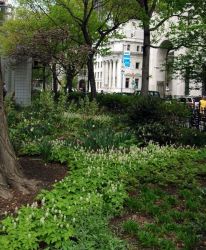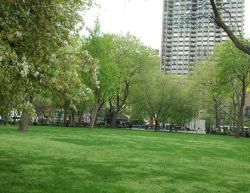Madison Square Park
View all monuments in NYC Parks, as well as temporary public art installations on our NYC Public Art Map and Guide.
Admiral David Glasgow Farragut
| Artist: | Augustus Saint-Gaudens |
| Dedicated: | May 25, 1881 |
| Location: | 25th Street between Fifth and Madison Avenues |
Artwork History
The Admiral Farragut Monument at the north end of Madison Square Park is one of the finest outdoor monuments in New York City. Its creation was a collaboration of two of the finest artistic spirits of their age, sculptor Augustus Saint-Gaudens and architect Stanford White.
Admiral David Glasgow Farragut (1801-1870), began his military career at age nine. He served as a midshipman on the frigate Essex during the War of 1812, and led campaigns against Caribbean-based pirates during the 1820s. He later fought in the Mexican War. At the outset of the Civil War, Farragut’s Union sympathies compelled him to move from Virginia to Hastings-on-Hudson, New York. He won lasting fame by wresting New Orleans from Confederate control. Then, against all odds, his troops defeated Confederate forces to take Mobile Bay where he uttered the immortal words: “Damn the torpedoes . . . full speed . . . ahead!”
These and other victories earned him the rank of Admiral in 1866, and he remained on active duty for life, one of only seven US Naval officers to achieve this distinction. When Farragut died in 1870, President Ulysses S. Grant attended his funeral in New York. He is buried at Woodlawn Cemetery in the Bronx.
The Farragut Monument was dedicated in 1881 and was Saint-Gaudens’ first public commission. It depicts the resolute Admiral Farragut in full naval uniform, standing erect with binoculars in hand and sword at his side, as if engaged in commanding a fleet. White designed the semi-circular exedra on which the monument stands. Overtime the monument has been revered for its dynamic naturalism.
The Farragut Monument was conserved in 2002, as a project of the Municipal Art Society’s Adopt-A-Monument Program, in partnership with the Department of Parks & Recreation and the Art Commission of the City of New York. A generous grant from the Paul and Klara Porzelt Foundation made the restoration possible. The monument’s conservation coincided with the restoration of Madison Square and today this outstanding example of nineteenth-century American commemorative sculpture remains a commanding presence in this historic park.
Artwork Details
| Description: | Standing figure (over life-size) with integral plinth, on pedestal with extended exedra wings; pedestal has bas-relief of sword in ocean waves; each wing has a life-size bas-relief of seated female figure |
| Architect: | Stanford White |
| Materials: | Bronze; Coopersberg (Pennyslvania) black granite |
| Dimensions: | Figure H: 9'; Pedestal with exedra wings H: 9' W: 17'6" D: 9'6" |
| Foundry: | Adolphe Gruet |
| Donor: | New York Farragut Association |
| Cast: | 1880 |
Inscription
Center:DAVID GLASGOW / FARRAGUT
West exedra:
THAT THE MEMORY OF A / DARAING AND SAGACIOUS COMMANDER AND / GENTLE GREAT-SOULED MAN WHOSE LIFE FROM CHILD- / HOOD WAS GIVEN TO HIS COUNTRY BUT WHO / SERVED HER SUPREMELY IN THE WAR / FOR THE UNION MDCCCLX I - MDCCCLXV / MAY BE PRESERVED AND / HONORED AND THAT THEY WHO COME AFTER / HIM AND WHO WILL OWE HIM SO MUCH MAY / SEE HIM AS HE WAS SEEN BY FRIEND AND / FOE HIS COUNTRYMEN HAVE SET UP / THIS MONUMENT AD MDCCCLXXXI.
East exedra:
BORN NEAR KNOXVILLE TENNESSEE / JULY V MDCCCI MID- / SHIPMAN MDCCCX BATTLE OF ESSEX / AND PHOEBE MARCH XXVIII MDCCCXIV / LIEUTENANT MDCCCXXV COMMAND- / ER MDCCCXLI CAPTAIN MDCCCLV / BATTLE OF NEW ORLEANS APRIL / XXV MDCCCLXII REAR ADMIRAL / MDCCCLXII BATTLE OF MOBILE BAY AUGUST / V MDCCCLXIV VICE ADMIRAL DECEMBER XX III MDCCCLXIV FIRST ADMIRAL OF THE UNITED STATES OF AMERICA JULY XXVI MDCCCLXVI DIED AT PORTSMOUTH NEW HAMPSHIRE AUGUST XIV MDCCCLXX.
Bronze crab:
AUGUSTUS SAINT GAUDENS SCULPTOR / STANFORD WHITE ARCHITECT
Please note, the NAME field includes a primary designation as well as alternate namingsoften in common or popular usage. The DEDICATED field refers to the most recent dedication, most often, butnot necessarily the original dedication date. If the monument did not have a formal dedication, the yearlisted reflects the date of installation.
For more information, please contact Art & Antiquities at (212) 360-8163.
Check out your park's Vital Signs
Clean & Safe
Green & Resilient
Empowered & Engaged Users
Share your feedback or learn more about how this park is part of a
Vital Park System



